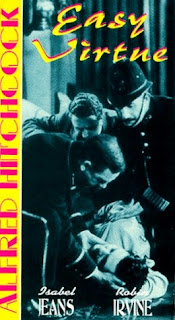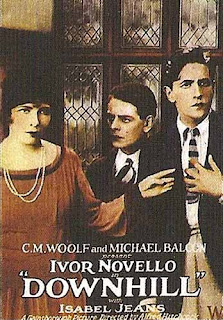
Title: The Ring
Year: 1927
Studio: British International Pictures Ltd
Original Screenplay: Alfred Hitchcock (and Alma Reville)
Running Time: 85 minutes
A Silent Picture in Black & White
Saturday 19th June, 9:30am
Well, I say 9:30, but this film was viewed sporadically throughout the day. This happened because of two reasons.
1) I was feeling awfully tired and had to take a couple of breaks (and naps)
2) It's a film about boxing.
I woke up with every intention of getting myself organised. Having awoken at 7:30 (that's a lie-in for me!) I made myself some breakfast, answered some emails and made sure the cat was fed and happy.
By 9:30, I was all comfy on the settee with my dressing gown on and I began my viewing.
A mere 30 minutes into the movie, I had to take a break as I was feeling a little exhausted. SO I pottered about, did some laundry... to be honest, I don't know what I did - anything to procrastinate! I got back into it at about 11:30, but another half an hour later, I felt the urge for an early lunch. I had some tomato soup and watched an episode of The Golden Girls. Then, I had to have a nap.
I awoke again at 4:30 and finished the final third of the film. Knowing I was going to be heading out for dinner with friends, I abandoned my goal of writing up my notes and left it until Sunday morning - so here I am.
Cast
"One Round" Jack Sander - Carl Brisson
Mabel - Lillian Hall Davis
Bob Corby - Ian Hunter
The Promoter - Forrester Harvey
The Showman - Harry Terry
Jack's Trainer - Gorden Harker
Synopsis
Once again, Hitchcock opens a silent film with a tremendous amount of noise. Drums bang, mouths chatter, guns fire in a coconut shy.
The fair ground is buzzing with activity; lots of people having fun. At one booth, a showman is rallying crowds to come and see some boxing matches. A young girl, Mabel, is selling the tickets. One of the champs is Jack "One Round" Sander whose name says it all.
Mabel sees a potential competitor - Bob Corby - in the crowd and beckons him over. He accepts the challenge. During the fight, Bob proves himself worthy and wins - not until the fourth round, mind you, and not before the showman has rallied more crowds to see this amazing defeat.
Bob takes his winnings and on the way out, stops to talk to Mabel.
Bob: "We heard he was good and now we know!"
Mabel: We were hoping to get married, and now you've probably lost him his job!"
The man Bob is with writes a note on the back of his business card. His note reads:
Don't fix any other job until I have seen you tonight."
Mabel turns it over and reads the front:
JAMES WARE. MANAGER TO BOB CORBY - Heavyweight Champion of Australia
Mabel is a little starstruck by Bob and he bids her farewell, for now.
That night, Mabel is tending Jack's wounds in the tent when Bob and James turn up. Mabel introduces them to Jack.
James and Jack go off to talk business and Bob takes Mabel for a walk outside.
Bob presents Mabel with a bracelet.
A present for you from the money I won.
The two potential lovebirds are being watched by a fortune teller in her caravan.
Meanwhile, James and Jack are coming to an arrangement:
"...and if you win this trial fight you can be Bob's sparring partner."
Jack likes the proposition and they shake on it - the handshake fades into Bob holding Mabel's arm as he puts the bracelet onto it.
When Jack comes to tell Mabel his news, she surreptitiously hides the bracelet from him.
Mabel goes to speak to the fortune teller and asks what time will bring her. The gypsy, with her knowledge and prior snooping, tells Mabel what she wants to hear.
The next day, Jack is outside his caravan, washing in the pond. Mabel comes to greet him and as she does, her bracelet falls off into the water. Jack retrieves it and she has to explain.
Mabel: "He bought me the bangle because he didn't like taking the money he won...
...So it was really you who gave it to me."
Jack takes the bracelet and places it, incongruously, over her wedding finger.
Jack: Then I give it to you for this... If I win the trial fight, we'll get married the day after!"
Later on, Mabel is back at her booth, fretting over the possible result of the trial fight. Eventually a telegram is delivered. It reads:
Have Won. Shall see you at church tomorrow morning as arranged, Jack.
The wedding is a colourful affair with a variety of odd guests including a pair of Siamese twins, a very tall man and a very small man. After a few comical moments involving the best man (Jack's trainer) and the ring, the wedding is over and a reception is held.
Bob makes a brief speech, touching a raw nerve:
Bob: I think the prize at the booth should have been this charming bride. Anyway, now he's my sparring partner I shall take my revenge."
Jack responds:
I shall always be ready to fight for my wife against any man.
Another day, at the gym, Jack and Bob are training. Mabel goes to chat to Bob and another woman asks her to introduce her to Mabel's husband - indicating Bob. Jack isn't pleased. he takes his frustration out on the punch bag, imagining Bob's face upon it.
Later, at Jack and Mabel's apartment, a wild party is in session with music and flapper girls dancing madly. In a quieter anteroom, James and Jack are discussing things.
Jack: It seems as though I shall have to fight for my wife after all.
James points out Jack's low-billing on a poster and says he has a way to go until he reaches the heights of Bob - implying that is what is needed to woo the women.
Eventually, the party dissipates and only Mabel is left. She's at the piano, playing a melancholy tune. When Jack goes over, he sees she has a framed picture of Bob in front of her.
After another successful fight, Jack and his entourage return to his apartment hoping to celebrate the good news with Mabel - She isn't home. Jack pours everyone champagne with the intention of drinking it upon her return. Time passes and the champagne begins to go flat. The boys realise they ought to leave and do so, leaving Jack to feel sorry for himself. Eventually, Mabel returns after a night out on the town with Bob. Jack flares up and throws Bob's picture across the room, smashing the champagne glasses. He rips Mabel's dress and tears her bracelet from her arm. She flees into her room.
He leaves the apartment after depositing the bracelet on the occasional table in the hallway. He is off to find Bob.
At the local club, he finds Bob with James. Bob attempts to be civil and offers Jack some champagne - Jack simply tips it out onto the floor. Insulter, Bob tips the table aside as a challenge - Jack simply punches him hard in the face, knocking him back. Jack tells James, who is in shock; He can try and reverse it in the ring if he likes!
Jack returns to the flat. The bracelet is gone and there's a note form Mabel on the mantelpiece.
I have gone to people who know how to treat me properly.
It's the night of the big fight at the Royal Albert Hall between Jack and Bob. Mabel turns up and sits in the front row.
Theirs is the fourth contest of the day and obviously the biggest spectacle of them all - everyone applauds when teh two fighters arrive at their corners.
Initially, the fight does not look good for Jack - he is distracted when he sees Mabel in the crowd and Bob catches him off guard. By round three, Jack is struggling.
In the break between rounds, Mabel - utterly distraught at witnessing his pummeling, makes her decision between the two men - she approaches Jack and whispers;
"Jack... I'm with you... in your corner."
This is all he needs. He strides into round floor and finally knocks Bob out cold.
Jack wins the fight and she removes the bracelet from her arm.
Afterward, in the dressing room, one of the crew hand the bracelet to Bob in his dressing room, saying he found it at the ring-side.
Bob looks at it and tosses it back to the man. He has lost more than just the fight.
The End
(not so) Great Lines
One would have imagined, knowing Hitch's wonderfully dark humour, that there would be more classy or bitchy lines within the script, but there are none to really shout about. Only one stands out, mainly because it feels so shockingly appalling due to its racist tones.
James: If you win this next fight with the nigger, you'll be in the running for the championship.
We have to look at this with a contemporary and contextual eye, but it still smarts.
Comments
Rather surprisingly, Hitch was a bit of a boxing fan and would attend a number of matches in his spare time.
This was Hitch's only screenplay (although written alongside his wife, Alma Reville, who was uncredited. Shame!) and without implying any disrespect to the great man, I am quite pleased he stuck to directing from here on in.
I have to admit, I was taken aback by the oddly embarrassing stall at the fair ground in which a black man sits on a dunking stool whilst white-folk attempt to knock him off - even when a couple of children throw eggs at his face, a policeman merely laughs at their antics - thank heavens we've come on a long way since then!
The boxing scenes are well shot, even if I do find them a little tedious.
Interestingly, the lead actor, Carl Brisson, was a professional boxer already, so there was little training for him to do. The scene where he knocks out Ian Hunter is rather realistic mainly because it was absolutely real!
The best thing about this film is the number of clever Hitchcock touches. His clever use of overlays, the way he gives the impression of time passing, the use of reflected surfaces (mirrors and water) for point of view shots... all these are beautifully arranged to lift the film from the ordinary to a higher level.
My Verdict
OK, so I am a little biased as I find films about sport incredibly tedious. Saying that, I would have hoped that the love triangle plot would make up for the drearier side, but it felt so unconvincing, especially the sudden turn-around for Mabel at the end. Fickle bitch! The only character I felt anything for was Jack, but that's probably due to his devilish good looks. Although it has many nice touches, it is not one of Hitchcock's best (although other critics would tell you otherwise).
4/10


